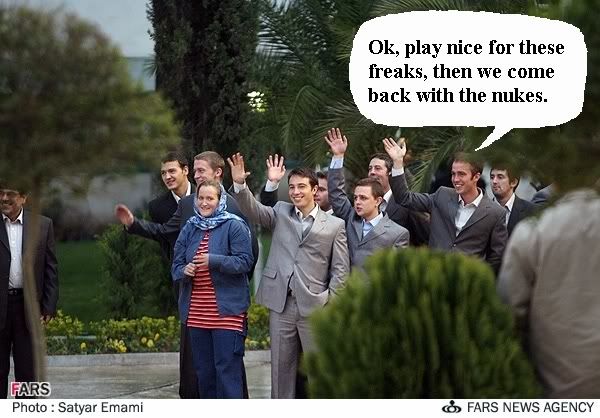

They cropped out the guys who weren’t waving.

Reminds me of old pics of occupied France during WW2.
Sieg, Heil!
All the rather childish cavorting before the Al Jezeera cameras yesterday...giving noogies, etc...made me wonder about the caliber of Brit military personnel. I don’t recall Americans acting like trained seals for the benefit of our enemies’ propaganda when they were released from a far-longer captivity of 444 days during the Carter disaster.
Those are soldiers? What a sorry-looking bunch of wimpy wusses!
I can’t help but wonder if some of these sailors might become suicidal over the embarrassment. After arriving at home and having time to think about how they behaved.

"Bye, and thanks for taking us to shop at your Goodwill Store."
Well, if you knew your government didn't have your back, how would you behave?
If I were them, I'd be looking to emigrate to Australia.
They turned a group of British servicemen into Borat.

“OK, play nice for these freaks, then we come back with the nukes.”
Come on, it must have been rough for them. Rumor is they had only black and white television, and being denied corkscrews they were forced to survive on food and water.
Have a heart, anyone would have turned.
What it all boils down to is, why didn’t the British mother ship blast the six iranian boats out of the water? That is what this story should be about!

“Rum, sodomy, the lash and an occassional fugly for the bi/boys.”

And those goofy British Kids all left with parting smiles, trinkets and gifts ...
* * * * *
A CHILD OF THE REVOLUTION TAKES OVER.
Ahmadinejad’s Demons
by Matthias Küntzel 1 | 2
Post date 04.14.06 | Issue date 04.24.06
During the Iran-Iraq War, the Ayatollah Khomeini imported 500,000 small plastic keys from Taiwan. The trinkets were meant to be inspirational. After Iraq invaded in September 1980, it had quickly become clear that Iran’s forces were no match for Saddam Hussein’s professional, well-armed military. To compensate for their disadvantage, Khomeini sent Iranian children, some as young as twelve years old, to the front lines. There, they marched in formation across minefields toward the enemy, clearing a path with their bodies. Before every mission, one of the Taiwanese keys would be hung around each child’s neck. It was supposed to open the gates to paradise for them.
At one point, however, the earthly gore became a matter of concern. “In the past,” wrote the semi-official Iranian daily Ettelaat as the war raged on, “we had child-volunteers: 14-, 15-, and 16-year-olds. They went into the minefields. Their eyes saw nothing. Their ears heard nothing. And then, a few moments later, one saw clouds of dust. When the dust had settled again, there was nothing more to be seen of them. Somewhere, widely scattered in the landscape, there lay scraps of burnt flesh and pieces of bone.” Such scenes would henceforth be avoided, Ettelaat assured its readers. “Before entering the minefields, the children [now] wrap themselves in blankets and they roll on the ground, so that their body parts stay together after the explosion of the mines and one can carry them to the graves.”
These children who rolled to their deaths were part of the Basiji, a mass movement created by Khomeini in 1979 and militarized after the war started in order to supplement his beleaguered army.The Basij Mostazafan—or “mobilization of the oppressed”—was essentially a volunteer militia, most of whose members were not yet 18. They went enthusiastically, and by the thousands, to their own destruction. “The young men cleared the mines with their own bodies,” one veteran of the Iran-Iraq War recalled in 2002 to the German newspaper Frankfurter Allgemeine. “It was sometimes like a race. Even without the commander’s orders, everyone wanted to be first.”
The sacrifice of the Basiji was ghastly. And yet, today, it is a source not of national shame, but of growing pride. Since the end of hostilities against Iraq in 1988, the Basiji have grown both in numbers and influence. They have been deployed, above all, as a vice squad to enforce religious law in Iran, and their elite “special units” have been used as shock troops against anti-government forces. In both 1999 and 2003, for instance, the Basiji were used to suppress student unrest. And, last year, they formed the potent core of the political base that propelled Mahmoud Ahmadinejad—a man who reportedly served as a Basij instructor during the Iran-Iraq War—to the presidency.
Ahmadinejad revels in his alliance with the Basiji. He regularly appears in public wearing a black-and-white Basij scarf, and, in his speeches, he routinely praises “Basij culture” and “Basij power,” with which he says “Iran today makes its presence felt on the international and diplomatic stage.” Ahmadinejad’s ascendance on the shoulders of the Basiji means that the Iranian Revolution, launched almost three decades ago, has entered a new and disturbing phase. A younger generation of Iranians, whose worldviews were forged in the atrocities of the Iran-Iraq War, have come to power, wielding a more fervently ideological approach to politics than their predecessors. The children of the Revolution are now its leaders.
http://www.tnr.com/doc.mhtml?i=20060424&s=kuntzel042406
Final, irrefutable and conclusive proof that the sun has set on the British Empire.
Someone please photshop Kerry in the bunnysuit into the pics.